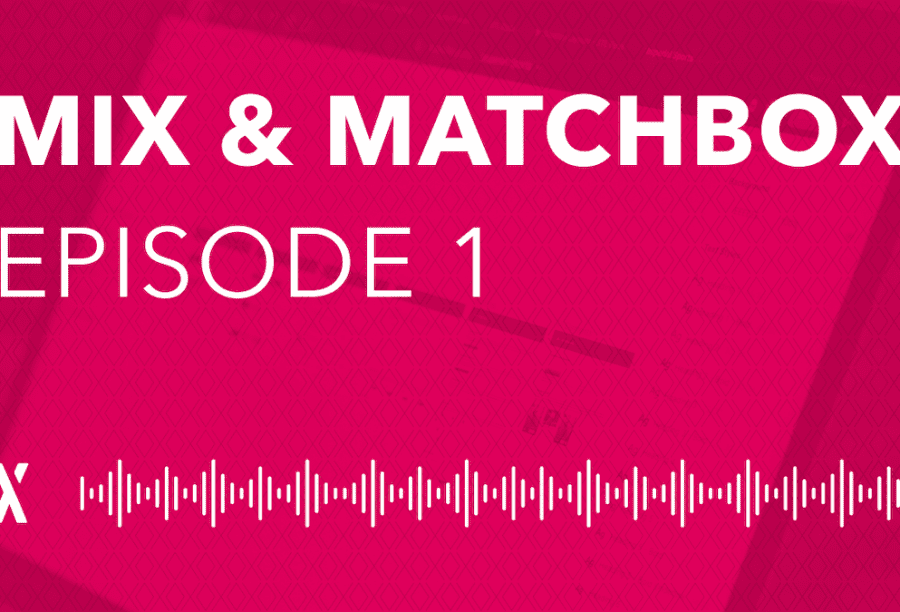
It wasn’t long ago that my boss and co-founder of Matchbox Design Group brought up the idea of a podcast. Personally, I thought it was a good idea, as long as we could keep Brent’s dad jokes or bad puns down to a minimum. And I really do mean none! 🙂 With that said the Podcast started to move forward, however, we are just going to have to deal with the bad puns. The truth is I actually think they are pretty funny.
Let’s start off with the overall description of the podcast, which by the way after much consideration has been named Mix & Matchbox. I’m personally not sure if it has something to do with mixing records, mixing up an interesting recipe for cookies, or the mix of talents that work at Matchbox Design Group. Anyways, as I said here is the Podcast description:
Mix & MatchBox Podcast Description

How do I successfully market my business online? What goes into building a custom website? Which digital tools are actually worth it? If you’ve found yourself asking any of these questions, then you’ve come to the right place!
The Mix & MatchBox podcast explores innovative digital tools, dissects complicated marketing strategies, and offers pro tips on how to grow your business online. Join podcast host Brent Feldman, Cofounder of Matchbox Design Group, in interviews with members of the Matchbox team, industry partners, and other marketing specialists.
We’ll break down complex marketing topics into bite-sized pieces to help you hone your marketing skills and thrive online.
We realize that our mission to “make the web better” is bigger than just us. So we’re passing the torch to you and hoping that you’ll join us in making the internet a more responsive, user-friendly, and accessible place for all.
WOW! That description sounded really serious. Don’t get me wrong we are tackling serious questions and giving you some great tips and tricks to help you with all of the topics discussed above. But, like I always say “I Don’t Trust Stairs, Because They’re Always Up To Something”. What does that quote have to do with anything? Not much. It was a bad pun though! 🙂
No, but seriously where I was going is that even though the podcast is answering some serious questions about a bunch of marketing and design topics, we are also going to have fun with it.
Our First Episode – Ep. 1 – Why We Use Figma
I will be honest with you. Personally, I have only heard of Figma because I know that we use it as a company. I have never used it before and I don’t know if I would know how to use it. At first, I thought it was some sort of cookie or leaf from a tree. I have been told that it is a design tool and if that’s the case I bet you can use it to check the contrast of 2 colors. We just want to make sure you can see the text all the time. You know because it leads to a good user experience and makes your website ADA compliant.
The First Episode’s Description
Brent Feldman, Cofounder at Matchbox Design Group, and UI/UX Designer, Alex Shaw chat over Google Meet about why our agency uses Figma for designing websites and digital assets.
Brent and Alex discuss Figma competitors like Sketch and Adobe XD, what programs they have used in the past, features, the community plugins, and why it’s great for the web development team. It’s not all rosy, we do cover the downsides to Figma but truth be told, it’s all pretty positive.
Let’s Get Right Into Some Of the Important Parts Of The Podcast
“Exploring why we as a company use Figma and I can definitely say that Alex is the person who really you know brought using Figma instead of what we were formally using which was sketch to the team sketch is wonderful.
It definitely has a lot of similar features to Figma but Alex definitely brought a very compelling case to us about you know, why the potential use it and he definitely won over the Dev team in terms of the exploration of different files and looking into them on the back end that made it just overwhelmingly compelling and that’s why we actually ended up switching everything from sketch to Figma.
Way back in the day, we actually used to do stuff in Photoshop. Which? Wow, I’m super glad that we don’t do that anymore. We were using a companion tool called Avocado or, Avocode and Avocode was good and I know there are things like Zeppelin out there that can certainly help, you know, dig into these files and actually be a pairing to things like sketch files or Figma files but at the end of the day, we actually just use Figma and the Dev team uses those Figma files to end up, constructing the websites that we put on the Web.
But anyway, all that being said, You know, I think that maybe one of the first things to address is that, just as there’s a competitor like Sketch, there’s also Adobe Xd and Alex, you’ve actually had an opportunity to kind of like do xd stuff as well beforehand, right?”
– Brent

“Yeah, so Xd was actually something I started out with Web design back in 2017 and I believe Sketch was one of the first big programs that come out for Web design.
I think it was 2010. I came out and Xd and Figma didn’t come out until about 2016, but Xd was the first one that I was introduced to just because I think as designers everybody is used to the Adobe suite and that was the program that Adobe created for web design and it is a great program but it seems to be that the majority of larger companies in the industry as a whole uses Sketch in Figma for a multitude of reasons.”
– Alex
“Definitely. Yeah, it’s really interesting because like XD was a product that seemed like it came out. And it really did start to kind of like modernize or really focus the web design and layout and prototyping, and all that sort of stuff in an Adobe product.
Which obviously had Photoshop really never necessarily was designed for, or I guess, you know, as we reflect on it should have been used for in the first place but it was definitely interesting to you know, see it be kind of used like that and so anyway so now you know that we’re kind of in this landscape after you know having seen all these different competitors. What is the thing that really drew you to Figma?”
– Brent
“Oh so I think the main thing and this is coming from, you know, first starting out as a designer. Even before I started my career as I was primarily a Windows-based designer which I know is not very common, it’s more common now. But even going back to my college days. You know, like a lot of colleges, have you buy a MacBook because it just seems to be the common tool and the common OS that designers use.
But given that I used a Windows computer, I needed something that ran on Windows and unfortunately, Sketch does not do that. You know, they are a Mac OS native app, which there are a lot of pros to that, but I think it obviously segments, you know, a lot of potential users from using that specific app and so that’s why I originally got into Adobe Xd for the first year.
So, you know, and then coming out of college I learned about Figma and one of the other reasons why it kind of stood out to me versus Xd from the start was it was very collaborative whereas like Sketch, an Adobe, Xd are really for designing and obviously handing off files to developers, but Figma was actually built from the ground up with collaboration in mind.
So when you think about that and thinking about, well, eventually when I do get into a career I’m gonna be working with developers and everybody else on the team. I wanted to have some software that actually worked better with that. So that’s how I started kind of getting into FEMA. And then obviously the rest was history.”
– Alex
Watch Or Listen To The Rest Of The Podcast
So there you have it. A good start to a lot of great information about Figma. If you would like to watch the entire podcast you can do so by watching the video below or clicking on this link to our podcast’s YouTube page.
If you would prefer just audio you can listen to our podcast on Spotify.
If you would like to read the transcript, you can do that here.
Please let us know what you thought about the first episode by leaving a comment on the video’s YouTube page. Give us a thumbs up and be sure to subscribe to the channel if you want to see more content like this answering the tough digital marketing questions. Oh and don’t worry you will get plenty of bad, or maybe good puns as the podcast series moves along.
If you have any questions please contact us at (314) 849 – 6969 or use our contact form to get a hold of us today.

